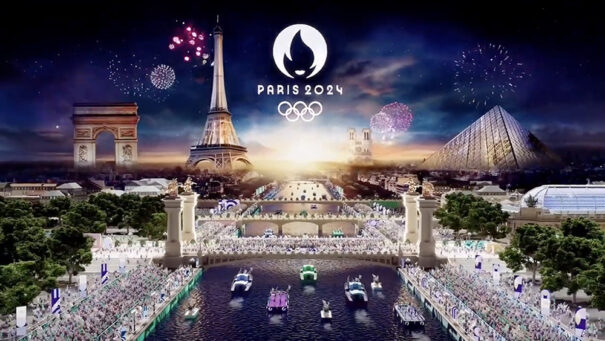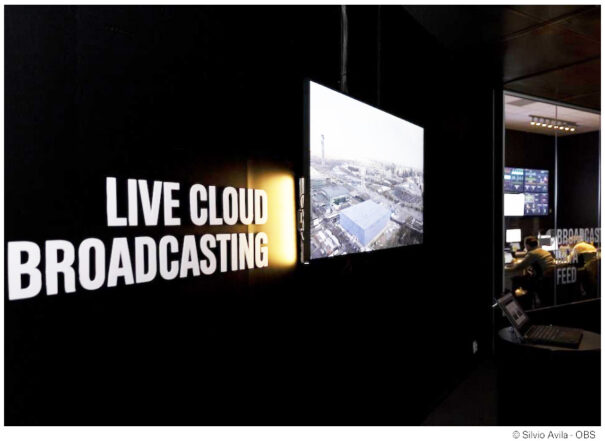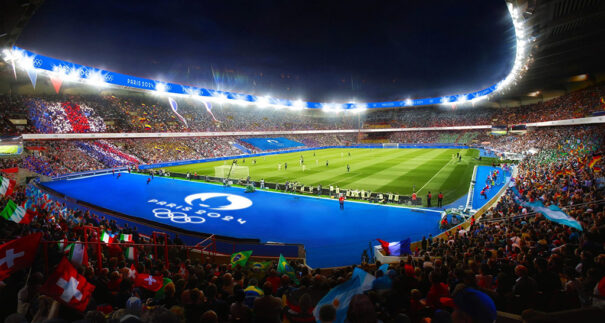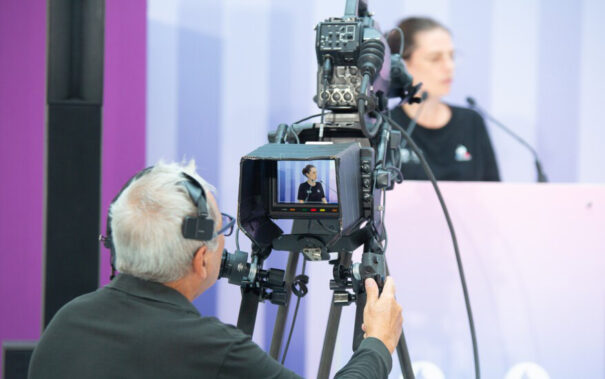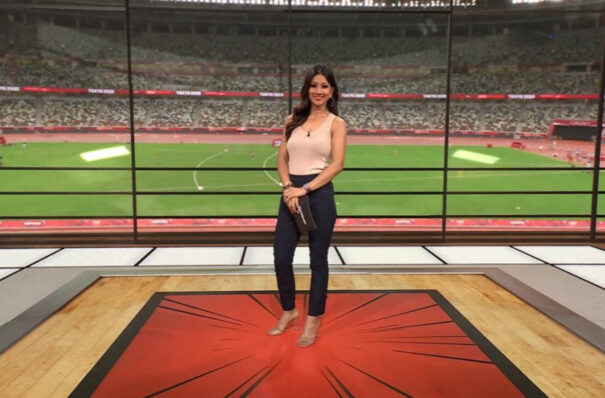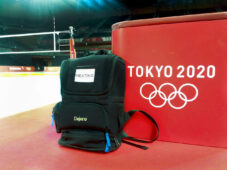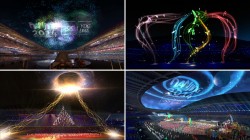The Paris 2024 Olympic Games showcase the latest advances in broadcast technology
Este fin de semana se inauguran los Juegos Olímpicos de París 2024 en los que, como es habitual, la industria broadcast pone a prueba sus últimas tecnologías. Isidoro Moreno, Head of Engineering of Olympic Broadcasting Services (OBS), aborda algunos de los principales retos como unidades móviles virtuales, estudio XR, producción remota, tecnología cloud, UHD, audio inmersivo…
Toda la industria de la tecnología broadcast, sea cual sea su lugar en el flujo de producción o distribución, quiere formar parte de los Juegos Olímpicos de Verano. Pocos pueden confirmar su participación, al margen de un puñado de technological partners, si bien todos y cada uno de ellos comparten “confidencialmente” a sus clientes y partners que han formado parte de esta cita. “¿Sabes la cámara subacuática de la natación? No digas nada, pero es nuestra”. ¿Quién no ha oído estas confesiones en los pasillos de del RAI de Ámsterdam en el otoño posterior a uno de estos eventos?
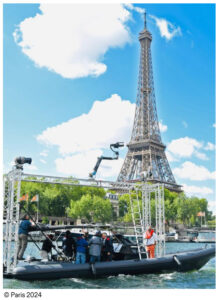 Que una de sus soluciones llegue a ser usada por el equipo de producción de OBS, la organización que tiene por misión realizar la mejor cobertura posible de los Juegos Olímpicos en todas sus variantes (verano, invierno, paralímpicos, youths…), es una meta por sí misma. Implica que dicha herramienta va a ser desplegada en un entorno de máxima exigencia para ser protagonista de una cobertura de alcance mundial. Sea esa retransmisión personalizada o no por cada uno de los rights-holders, la tecnología ocupará un papel fundamental tanto en el frontend, captando la espectacularidad de los deportes y apoyando su narración, como en el backend, con procesos de producción y distribución que se sitúan a la vanguardia de la producción deportiva.
Que una de sus soluciones llegue a ser usada por el equipo de producción de OBS, la organización que tiene por misión realizar la mejor cobertura posible de los Juegos Olímpicos en todas sus variantes (verano, invierno, paralímpicos, youths…), es una meta por sí misma. Implica que dicha herramienta va a ser desplegada en un entorno de máxima exigencia para ser protagonista de una cobertura de alcance mundial. Sea esa retransmisión personalizada o no por cada uno de los rights-holders, la tecnología ocupará un papel fundamental tanto en el frontend, captando la espectacularidad de los deportes y apoyando su narración, como en el backend, con procesos de producción y distribución que se sitúan a la vanguardia de la producción deportiva.
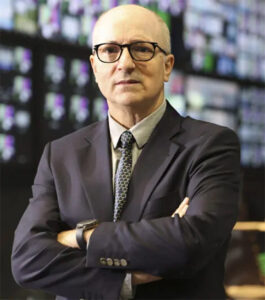 Los Juegos Olímpicos de París 2024, que se celebran desde hoy viernes 26 de julio hasta el domingo 11 de agosto, volverán a contar con un mastodóntico despliegue tecnológico que hará gala de los últimos avances del universo de la tecnología broadcast. Isidoro Moreno, responsable de ingeniería de OBS, aborda la filosofía tras la retransmisión de los próximos JJ. OO., adelanta novedades de primer nivel como sus nuevas unidades móviles virtuales, anticipa un nuevo panorama en el que la deslocalización se postula como pilar de las producciones y, en definitiva, adelanta cómo los Juegos Olímpicos volverán a agitar el tablero de juego anticipando procesos y flujos de trabajo que marcarán a la industria hasta, por lo menos, 2028.
Los Juegos Olímpicos de París 2024, que se celebran desde hoy viernes 26 de julio hasta el domingo 11 de agosto, volverán a contar con un mastodóntico despliegue tecnológico que hará gala de los últimos avances del universo de la tecnología broadcast. Isidoro Moreno, responsable de ingeniería de OBS, aborda la filosofía tras la retransmisión de los próximos JJ. OO., adelanta novedades de primer nivel como sus nuevas unidades móviles virtuales, anticipa un nuevo panorama en el que la deslocalización se postula como pilar de las producciones y, en definitiva, adelanta cómo los Juegos Olímpicos volverán a agitar el tablero de juego anticipando procesos y flujos de trabajo que marcarán a la industria hasta, por lo menos, 2028.
La misión de OBS
Históricamente, la televisión nacional local se hacía cargo de la producción broadcast de cada edición de los Juegos Olímpicos. Esta forma de trabajar aportaba beneficios logísticos y operacionales, pero implicaba una pérdida de know-how de edición a edición, por muchos esfuerzos colaborativos que emprendieran los equipos de ingeniería.
Este planteamiento cambió en torno a 1992, año en el que la Ciudad Condal acogió la que sigue siendo considerada como una de las mejores ediciones de todos los tiempos: “Todo el mundo habla mucho de Barcelona. Se produjeron importantes avances en cobertura, tecnología utilizada, nuevos sistemas o formas de hacer la producción, pero también surgió una idea germinal para grandes eventos: tener un host broadcaster o una división dentro del propio Comité Olímpico que abriera una gran colaboración internacional en la que muchas televisiones de todo el mundo aportaran profesionales. Y no solamente ingenieros, sino también productores o realizadores con mucha experiencia en deportes en concreto”.
OBS ha acumulado un notable historial en la realización de los JJ. OO. que ha permitido “realizar la mejor producción de televisión posible para el evento con los medios tecnológicos y técnicos necesarios”.
Según Moreno, este modelo funcionó, si bien limitada por procesos como la transferencia de conocimiento, lo que hacía que fuera necesario “empezar, en parte, desde cero” con cada edición de los JJ. OO.. Este factor acabó derivando en la creación de Olympic Broadcasting Services (OBS), una división completamente propiedad del Comité Olímpico Internacional que permite garantizar la continuidad en la calidad de la cobertura y conseguir una mayor eficiencia en los recursos.
Gracias a esta misión iniciada en 2001, OBS ha acumulado un notable historial en la realización de los JJ. OO. que ha permitido “realizar la mejor producción de televisión posible para el evento con los medios tecnológicos y técnicos necesarios”. “Esa es nuestra misión, nuestra función y nuestro deseo”, sentencia el responsable de ingeniería de la compañía.
De Gangwon a París: una prueba de concepto crucial
Una de las ventajas de que OBS acumule experiencia, recursos y profesionales en la producción broadcast de los JJ. OO. es la consolidación de líneas de trabajo. Esto permite que una tecnología o un flujo de trabajo sea puesta a prueba a pequeña escala para así garantizar su idoneidad en el siguiente gran evento en el calendario olímpico: “Nos pasó con la ultra alta definición en el caso de los Juegos Olímpicos de Invierno de Pyeongchang 2018. Fue la primera vez que hicimos 8K y 4K en paralelo, un flujo de trabajo que consolidamos de cara a Tokyo 2020”, recuerda Moreno.
 Existen decenas de pruebas similares, a mayor o menor escala, en cada una de las celebraciones olímpicas. En los últimos Juegos Olímpicos de la Juventud, que se celebraron a comienzos de año en Gangwon (Corea del Sur), se llevó a cabo la proof of concept for the nueva unidad móvil virtual de OBS, definida por Moreno como un proyecto “muy ambicioso, muy novedoso y que creemos que va a tener muchísimo futuro”.
Existen decenas de pruebas similares, a mayor o menor escala, en cada una de las celebraciones olímpicas. En los últimos Juegos Olímpicos de la Juventud, que se celebraron a comienzos de año en Gangwon (Corea del Sur), se llevó a cabo la proof of concept for the nueva unidad móvil virtual de OBS, definida por Moreno como un proyecto “muy ambicioso, muy novedoso y que creemos que va a tener muchísimo futuro”.
La nueva unidad móvil virtual de OBS surge como respuesta logística y tecnológica a la naturaleza bianual de los JJ. OO. Para no contar con un inmovilizado sin utilizar dados los espacios entre competiciones, así como para poder disfrutar de la última tecnología, la compañía siempre había optado por el alquiler para hacer realidad su visión creativa y tecnológica. Esto abarca también las unidades móviles, vehículos que al ser ofrecidos por proveedores de servicios internacionales cuentan con una infraestructura muy variada para aportar la flexibilidad necesaria para producir todo tipo de contenido. “Partiendo de este concepto, se nos ocurrió una idea. ¿Y si en vez de tener tanto material y hardware dedicado, lo que hago es contar con un hardware estándar?”, comenta Moreno.
“Las unidades móviles virtuales nos permiten evitar tener elementos que no utilizamos y asumir su coste, porque al mover una unidad móvil también muevo esos recursos que no necesitamos. Además, podemos tener un servicio mucho más eficiente, ya que podemos activar el software solo cuando lo necesitamos”.
Para hacer realidad su visión, OBS se ha apoyado en servidores edge de última generación para interconectar el hardware estándar de sus unidades móviles con el software de “cada uno de los elementos que necesitamos” y simular, de esta forma, una unidad móvil tradicional. Moreno considera que este acercamiento implica importantes ventajas: “Nos permite evitar tener elementos que no utilizamos y asumir su coste, porque al mover una unidad móvil también muevo esos recursos que no necesitamos. Además, podemos tener un servicio mucho más eficiente, ya que podemos activar el software solo cuando lo necesitamos. También evitamos los desplazamientos de grandes unidades móviles por todo el mundo para que estén disponibles para los Juegos Olímpicos; para Tokio, tuvimos muchas unidades móviles europeas que estuvieron viajando durante semanas”.
Moreno afirma que este nuevo planteamiento de OBS basado en unidades móviles virtuales a día de hoy “no es mucho más barato” que el modelo de alquiler tradicional que ha venido siguiendo la productora, si bien cuenta con un “futuro mucho más prometedor”.
¿La industria está lista para la unidad móvil virtual de OBS?
Construir una unidad móvil virtual implica un importante trabajo de conceptualización e ingeniería, así como precisa de una oferta suficientemente consolidada por parte de la industria broadcast para garantizar soluciones virtualizadas que puedan funcionar con solvencia en los entornos críticos en los que operará OBS. Esto ha llevado a Moreno y a su equipo a explorar el mercado y mantener decenas de conversaciones con todo tipo de fabricantes, un proceso complejo que ha llegado a buen puerto: “La mayoría de los elementos ya estaban disponibles, pero otros que entendíamos que iban a ser fáciles han sido especialmente complejos. Por ejemplo, nos costó mucho encontrar un mezclador de audio basado en cloud”.
“El proyecto de unidades móviles virtuales que hicimos en Gangwon 2024, en el que quisimos comprobar especialmente si los retardos eran razonables para hacerlo viable en formato UHD, funcionó a la perfección”.
El elemento más crítico, y el que ha costado más a OBS elegir e implementar, fue el sistema de orquestación: “Necesitábamos un software que fuera capaz de hablar con todos los elementos, pero no lo encontramos. Al final, tuvimos que hacer un mix considerable, ya que contamos con muchos proveedores diferentes y no todos tienen el mismo nivel de apertura para su aplicación”, traslada Moreno, quien justifica esta falta de oferta en lo novedoso de este sistema de producción: “Este va a ser un proceso largo, pero creemos que se va a estandarizar, lo que hará que la orquestación sea mucho más sencilla en el futuro”.
He proof of concept de las unidades móviles virtuales, puesto en marcha en Gangwon, cumplió todas las expectativas del equipo de OBS. París 2024 será la prueba de fuego: “El proyecto que hicimos, en el que quisimos comprobar especialmente si los retardos eran razonables para hacerlo viable en formato UHD, funcionó a la perfección”.
11.000 horas de contenido
Las unidades móviles virtuales, unidas a recursos de producción más tradicionales y con la captación ofrecida por más de 1000 cámaras, conformarán una producción con más de 11.000 horas de contenido, de las cuales cerca de 4.500 horas corresponderán a producción de deporte en directo y las ceremonias. Todo, para que los rights-holders cuenten con los recursos que precisan para trasladar a los espectadores la intrahistoria de la competición y ayudar a conocer a sus atletas: “Uno de los objetivos que tenemos es hacer entrevistas a todos los atletas, da igual que tengan medallas o no. De esta forma, garantizamos que cada televisión pueda tener contenido específico”. La narrativa es otro de los motores que ha empujado a OBS a redoblar su apuesta por el contenido. Tal y como comenta Moreno: “En los Youth Olimpics hemos podido entrevistar a deportistas de 14 hasta 18 años que pueden llegar a ser multimedallistas. Así podemos trazar su historia”.
OBS ha trabajado intensamente en generar procesos de generación automática de piezas based on metadata e artificial intelligence trained by machine learning y siempre supervisada por un operador humano.
Más allá de la retransmisión en directo de las pruebas y las entrevistas, OBS ofrecerá resúmenes, imágenes de ambiente olímpico, montajes musicales o las piezas informativas del Olympic News Channel. Estas noticias, que en Pekín llegaron a 400 unidades informativas de entre tres y cuatro minutos, se abordarán con la habitual perspectiva neutral que acompaña a la competición olímpica. ¿Pero qué sucede con aquellos broadcasters que busquen contar con contenido concreto centrado en su país, una región o un atleta en particular?
Para abordar esta casuística, OBS ha trabajado intensamente en generar procesos de generación automática de piezas based on metadata e artificial intelligence trained by machine learning y siempre supervisada por un operador humano. “Daremos como opción a los radiodifusores que puedan parametrizar sus deseos particulares; serán una serie de deseos limitados, pero les posibilitará generar contenido de una manera muy eficiente”, explica Moreno. Este sistema, que contará con un flujo de trabajo a través de “punteros” que permiten adaptar la duración de cada pieza sugerida, no busca reducir los puestos de trabajo, sino ayudar a crear “mucho más contenido” que “por tiempo o por la capacidad humana te podías perder pero que podía ser muy interesante”.
IBC: menos espacio y consumo de energía
Al tiempo que las horas de cobertura de los JJ. OO. de París 2024 alcanzan cifras de récord, el IBC (International Broadcast Center) de la competición será un 13% más pequeño que el de Tokyo 2020, así como consumirá un 44% menos de energía. The eficiencia, de esta forma, se confirma como uno de los valores clave de la competición; una optimización de recursos que, como comenta Moreno, no podía haber sido posible hace unos años: “La tecnología cada vez nos da más opciones de lo que queremos hacer. Cada vez somos más eficientes y hacemos más retransmisiones por más métodos diferentes. Seguiremos utilizando satélite, pero también fibra óptica e incluso internet para la distribución”.
"He IBC se está convirtiendo poco a poco en un espacio más cercano al de trabajo de oficina (…). Ya no parece que sea tan imprescindible montar grandes sistemas de televisión”.
Las mejoras en materia de distribución puestas en marcha por la industria broadcast y favorecidas por la consolidación del mundo IP han permitido que los radiodifusiores puedan prescindir de transportar grandes equipos para aprovechar las capacidades de distribución ofrecidas por la propia OBS: “El IBC se está convirtiendo poco a poco en un espacio más cercano al de trabajo de oficina, en el que hay equipos ENG que llegan con su ordenador, hacen una edición de su material particular, y cuentan con la conectividad necesaria para distribuir contenido. Ya no parece que sea tan imprescindible montar grandes sistemas de televisión”.
El IP en la retransmisión de París 2024
Tras la puesta en marcha en Tokio 2020 del transporte de contenido a través del mundo IP, París 2024 volverá apostar por superar las limitaciones del SDI en paralelo a la evolución de las posibilidades ofrecidas por el mundo Telco y los primeros pasos del mundo broadcast hacia este campo: “Con SDI, el uso de los anchos de banda no era del todo eficiente. Para hacer un UHD necesitabas 12G, pero resulta que los links estándar de comunicaciones eran de 10, 40 o 100, múltiples que no son necesariamente de 12G. El mundo IP te permite utilizar muchísimo mejor el ancho de banda”, apunta Moreno.
El flujo de trabajo será similar, por tanto, al que se ejecutó en la capital japonesa: “Desde que generamos la señal en la sede deportiva y lo transmitíamos al IBC, hicimos un transporte de 2022/7, que permite meter en dos líneas distintas el mismo contenido y, en el caso de que una de las dos líneas se venga abajo, recuperar en destino sin pérdida de paquetes”. Otra cuestión es la entrega de contenido directamente a los broadcasters, que será ofrecido con enlaces tanto en 12G como en SMPTE ST 2110: “Esto nos permite hacer una transición más pausada, ya que no todos los radiodifusores transitan al mismo tiempo”.
La entrega de content directamente a los broadcasters será ofrecida con enlaces tanto en 12G como en SMPTE ST 2110: “Esto nos permite hacer una transición más pausada, ya que no todos los radiodifusores transitan al mismo tiempo”.
Para Moreno y su equipo, es necesario responder a las necesidades de cada uno de los broadcasters a los que dan servicios: “La alta definición la hicimos en Barcelona 92, pero realmente las televisiones empezaron a adaptarse al HD en torno a los años 2000 y no hicimos una cobertura completa hasta Pekín 2008. También recuerdo cómo en Sídney 2000 el 40% de los enlaces eran transmisión SDI y el 60% era analógico. Dos años después, en Salt Lake City, los porcentajes se intercambiaron, y en Atenas 2024 hicimos todo digital”.
“Tenemos una obligación de retrocompatibilidad que nos obliga a que cualquier cliente pueda tener un formato que le permita hacer su trabajo de manera correcta. Esto claro que nos limita, pero por otro lado supone un desafío poder satisfacer todas las necesidades de manera eficiente. Pasa lo mismo con el audio: hacemos un 5.4.1, pero también nos preocupamos de que el usuario pueda recibir la mezcla perfectamente en estéreo”, concreta Romero.
¿Lo remoto tiene sentido en los JJ. OO de verano?
Una constante en la producción deportiva ajena a los Juegos Olímpicos son los flujos de trabajo de producción remota, puestos a prueba en competiciones de primer nivel y, de hecho, asumidos por la propia OBS en eventos como los Youth Olympics. “Hemos hecho muchos eventos reducidos con formato de producción remota y el 100% de la distribución fue en remoto. Teníamos actividades en cada sede e hicimos un passthrough en el IBC para transmitir las señales en nuestra red internacional y transmitirlas en Madrid”, aclara Moreno.
Este flujo de trabajo encaja con los Juegos de la Juventud, dado que la gran mayoría de los broadcasters no están presentes con sus propios despliegues en el propio IBC. El caso de París 2024 será el opuesto: “No tiene mucho sentido que produzcamos en París, lo mandemos a Madrid, y lo devuelva a París para que un señor que está en la sede de Equestrian tenga sus señales”, explica Moreno.
“Si se quiere hacer producción remota, OBS va a dar todas las facilidades para que el broadcaster pueda acceder a cualquier contenido esté donde esté, y decidir si construye su cobertura de forma local, remota o híbrida”
A pesar de ello, los próximos JJ. OO. contarán con flujos de trabajo de contribución remota que permitirán que cada broadcaster elija la forma con la que quiere interactuar con los feeds oficiales de OBS, así como personalizar sus propias retransmisiones: “Estamos extendiendo servicios que antiguamente eran imposible, como contar con una copia de una cámara que puedes tener en la sede de cada disciplina, en el IBC o directamente en tu oficina. Eso hace que el nivel de remoto dependa del propio radiodifusor. Hay algunos radiodifusores que gestionan sus operaciones de forma remota, mientras que otros deciden, bien por capacidad económica o por su propia línea editorial, construir todo localmente”.
“Por ello, si se quiere hacer producción remota, OBS va a dar todas las facilidades para que el broadcaster pueda acceder a cualquier contenido esté donde esté, y decidir si construye su cobertura de forma local, remota o híbrida”, apunta el responsable de ingeniería sobre la capacidad de adaptación de la productora.
UHD: estándar en París… y alternativa entre los broadcasters
La distancia entre el mundo IPTV y la oferta por parte de los broadcasters tradicionales en lo relativo a la UHD se extiende al contenido olímpico. El equipo de OBS, al igual que en Tokio 2020, apostará por una producción 100% UHD en resolución 4K HDR, si bien la downconversion seguirá siendo una prioridad entre muchos de los rights-holders de los próximos JJ. OO..: “Muchos de los radiodifusores que se mostraron interesados en el formato UHD HDR para Tokio 2020 acabaron por emitir en 1080p HDR dado que el salto podía ser muy caro. Comprobamos que existió poco interés en UHD; había mucha menos gente de la que pensábamos. Esto hizo que hiciéramos mucho esfuerzo en realizar una buena conversión para que hubiera compatibilidad y que incluso aquellos que tenían televisiones en SDR pudieran ver la competición de la mejor manera posible”.
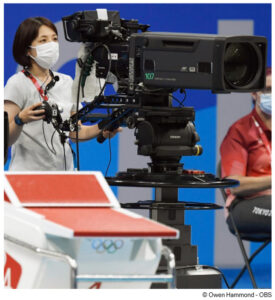 De cara a París 2024, OBS está preparada para entregar a sus clientes la máxima calidad en el contenido, si bien hasta último momento no sabrán cuál vuelve a ser la opción más extendida entre los rights-holders: “La mayoría de los radiodifusores nos están pidiendo tanto HD como UHD. Poco a poco empiezan a darse cuenta de que es una mejora muy grande, los costes han disminuido y, además, los espectadores han cambiado: si antes eran pasivos y eran las televisiones las que forzaron la evolución de mercado, ahora están pidiendo la máxima calidad. La transición puede que sea mucho más rápida de lo esperado”, reflexiona Moreno.
De cara a París 2024, OBS está preparada para entregar a sus clientes la máxima calidad en el contenido, si bien hasta último momento no sabrán cuál vuelve a ser la opción más extendida entre los rights-holders: “La mayoría de los radiodifusores nos están pidiendo tanto HD como UHD. Poco a poco empiezan a darse cuenta de que es una mejora muy grande, los costes han disminuido y, además, los espectadores han cambiado: si antes eran pasivos y eran las televisiones las que forzaron la evolución de mercado, ahora están pidiendo la máxima calidad. La transición puede que sea mucho más rápida de lo esperado”, reflexiona Moreno.
He 8K o UHD2 también contará con nuevos campos de prueba en París 2024 con despliegues en las ceremonias, el baloncesto 3×3, el breaking y las pruebas de skateboarding en sus modalidades Street y Park. Moreno no duda en destacar las bondades de este formato, como “una gran resolución cercana a la película de cine” o “un espectro de color que se acerca a la realidad”, pero reconoce que su alcance será muy limitado por la escasez de televisores compatibles con 8K o las limitaciones de las vías de distribución. Estas resoluciones también implican desafíos en términos de producción: “No contamos con el 100% de las cámaras que queremos utilizar en 8K. Por ejemplo, algunas minicámaras, o no cuentan con las resoluciones, o no disponen de una modalidad de transferencia adecuada, ya que los enlaces de radiofrecuencia que utilizamos presentan unas latencias en la transferencia en 8K de hasta 10 segundos que no podemos aceptar para las retransmisiones en directo”.
Evolucionando la XR con un estudio virtual en la Villa Olímpica
The espectacularidad y opciones de narración ofrecidas por la extended reality en el ámbito deportivo ha supuesto una de las mayores evoluciones en la retransmisión de contenido deportivo de los últimos años. OBS, pioneros en esta disciplina, seguirán profundizando en este tipo de despliegues en numerosas pruebas, acompañando estos despliegues de grafismo con mejoras procedentes del mundo de la IA: “Estamos intentando conseguir ver el giro de la pelota de ping pong para enseñar los efectos que tienen. Otros elementos que podremos representar será metadata asociada a datos biométricos siempre que se cuenten con los permisos correspondientes, como cuando captamos el ritmo cardíaco en la prueba de tiro con arco. No solo es contar con la tecnología, sino que hay que tener muy en cuenta algunas limitaciones legales”.
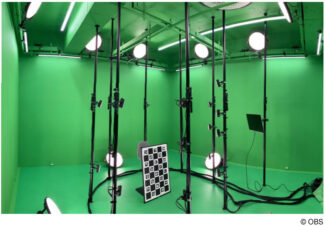 Dentro del universo XR, una de las grandes novedades de OBS ofrecida a sus rights-holders implica el desarrollo de un estudio virtual ubicado en la Villa Olímpica desde el cual se podrán hacer entrevistas remotas simulando la presencialidad de presentadores y atletas. Partiendo de parámetros de movimiento de cámara, tacómetro y sistemas remotos, será posible realizar entrevistas trasladando la cámara y manteniendo las proporciones, uno de los fallos más frecuentes de aplicaciones previas de esta técnica. Moreno explica que la integración de este sistema será sencilla para que los radiodifusores puedan tener acceso a los parámetros de la cámara y poder “simular el render con dispositivos estándar”.
Dentro del universo XR, una de las grandes novedades de OBS ofrecida a sus rights-holders implica el desarrollo de un estudio virtual ubicado en la Villa Olímpica desde el cual se podrán hacer entrevistas remotas simulando la presencialidad de presentadores y atletas. Partiendo de parámetros de movimiento de cámara, tacómetro y sistemas remotos, será posible realizar entrevistas trasladando la cámara y manteniendo las proporciones, uno de los fallos más frecuentes de aplicaciones previas de esta técnica. Moreno explica que la integración de este sistema será sencilla para que los radiodifusores puedan tener acceso a los parámetros de la cámara y poder “simular el render con dispositivos estándar”.
Frecuencias, 5G y slicing en París 2024
Algunas de las coberturas más desafiantes de París 2024 serán aquellas que impliquen movilidad y emplazamientos remotos, ya se esté produciendo una maratón o una prueba de sailing. Muchas de las conexiones serán proporcionadas por modelos tradicionales, como las frecuencias (a pesar de lo compleja de su cuestión), la fibra o incluso conexiones satelitales.
He 5G jugará un papel fundamental en estas retransmisiones, pero en una cierta medida no será mediante las prometidas capacidades del 5G slicing, una tecnología “un poco limitada” en la actualidad para Moreno. La resiliencia, como valor fundamental de las retransmisiones de los próximos Juegos Olímpicos, ha llevado a OBS a confiar en el 5G, pero con la construcción de redes privadas: “Al montar una red privada la gestión de la frecuencia es mucho más fácil, ya que estás utilizado una banda certificada y el servicio nos lo dará el operador en el país”.
Un segundo beneficio en este campo será la gestión de la red 5G para priorizar determinados activos según lo requiera cada producción: “Al gestionar la red 5G de manera privada podemos dar prioridad a determinadas cámaras que consideramos que tienen más importancia que otra”. Moreno reconoce que OBS está “abierta a todo tipo de tecnologías que nos faciliten la producción”, pero celebra el rendimiento del 5G tanto por sus anchos de banda “muy flexibles” representativos del “mundo IP”.
IA: sin vuelta atrás
Al ser cuestionado por aquellas tecnologías disruptivas de vital importancia para la cobertura de París 2024, Moreno no duda en destacar, incluso por encima de innovaciones como su unidad móvil virtual o su estudio XR, el uso de IA en todo tipo de procesos. Sí, la inteligencia artificial y la metadata será utilizada para favorecer la personalización de los contenidos o generar piezas de interés de forma veloz como un posible récord mundial, pero esta es solo la primera de decenas de otras aplicaciones que verán la luz progresivamente: “Tenemos muchos proyectos abiertos: tanto herramientas que utilizaremos para disciplinas, como otras pruebas de concepto que aplicaremos en el futuro”.
“Tenemos muchos proyectos abiertos en torno a la IA: tanto herramientas que utilizaremos para disciplinas, como otras pruebas de concepto que aplicaremos en el futuro”.
La inteligencia artificial tendrá, por tanto, un importante rol en la producción de contenido para los próximos JJ. OO., pero también existe un lado “no tan visible” que ha sido vital para el trabajo de OBS: la planning. “Al usar estas tecnologías, hemos podido gestionar la planificación de los JJ. OO. de manera mucho más eficiente. Antes llevábamos un solo evento y a lo mejor contábamos con hasta 300 personas trabajando en esta fase de planificación. Ahora somos 160 y llevamos simultáneamente Juegos de Invierno, Juegos de Verano, Juegos de la Juventud, las sesiones la UIC y las Youth Series. Esto es algo que solo se puede hacer con herramientas que te ayudan a comunicarte, compartir documentación y tomar decisiones de una manera mucho más asistida”, incide Moreno, no solo sin resistirse al cambio, sino reconociendo, una vez más, cómo la tecnología es capaz de hacer realidades aparentes imposibles.
A report by Sergio Julián Gómez
Did you like this article?
Subscribe to our NEWSLETTER and you won't miss anything.



